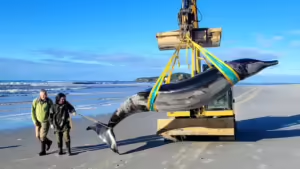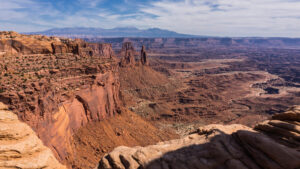Back in mid-January, hikers in England found themselves fuming over the legal success of a landowner named Alexander Darwall, who raised a lawsuit that effectively ended the long-accepted English practice of “wild camping.”
Darwall owns about 1,620 hectares in Dartmoor National Park. And when he argued in court that pitching a tent for the night on privately owned land without getting permission first was never allowed, the court listened.
According to The Sierra Club, Dartmoor was the last place in the country that still allowed wild camping — a traditional practice that English hikers valued highly. There’s precious little public land in the British Isles, so the handshake agreement between landowners and recreational users was vital. As The Sierra Club pointed out, “the right to walk freely across common land — often privately owned yet retaining historical and legal access for non-owners, or ‘commoners,’” represents just 8 percent of the English countryside.
In the U.S., a liability issue
Meanwhile, a texturally similar land access rights dispute played out on the other side of the Atlantic. A Colorado judiciary committee struck down an amendment to the state’s Recreational Use Statute that would have protected landowners more strongly against liability for anyone injured while using their property. In the wake of that decision, the owner of two 14,000 ft. peaks along one popular trail closed his land to the public indefinitely.
John Reiber owns the summits of Mount Democrat and Mount Lincoln, two prominent peaks along the Decalibron Loop — an 11km trail that many hikers looking to snag multiple “14ers” in a day seek out.
But attorneys have advised him that the Colorado Recreational Use Statute (CRUS) is so loose that he should mark his land “no trespassing” to protect himself from lawsuits. In fact, an insurance agent working for Reiber has failed to convince any insurer to cover him for damages incurred on his property. Liability under the statute is just too high.

Mount Democrat, part of the Mosquito Range’s Decalibron Loop. Photo: Jeremiah LaRocco via Wiki Commons
Private vs public
While the specifics between the two cases are disparate and unconnected, they share one singular, uniting factor. Both landowners want better control over what people can and cannot do on their property.
Darwall, a “self-made millionaire,” according to The Sierra Club, explained himself in a statement obtained by the BBC.
“The truth is that there is no threat to access or true wild camping. Dartmoor is increasingly under pressure from fly campers, litter, raves, and so on. We want to keep Dartmoor unspoiled with the principle of leave no trace,” the statement read.
It went on to state that Darwall and his wife, who have owned the parcel since 2013, take the “legal and environmental responsibilities” on the property seriously. It referred to those among the litterers and ravers as “a small number of people who spoil it for everyone.”
A legislative challenge
ExplorersWeb interviewed Reiber on Mar. 7. The similarity between Darwall’s statement and the thrust of that interview was striking. Reiber began by clarifying his strong preference to keep the land open for those who use it responsibly.
“I’ve done everything I can to let people enjoy this land, and I’ve worked for years to keep it open. I’ve spent almost 20 years trying to figure out how to let folks enjoy the peaks — and how to not assume liability for behavior that may not be stellar,” he said.
From a legal standpoint, “recreation” can be almost anything under the CRUS. Reiber has offered free access to his land in the past. He’s become concerned about liability from firearm use (many signs near the peaks are riddled with bullet holes) and campfires. The growing wildfire danger in the American west is well-documented.
The recent legislative challenge to the statute, Senate Bill 103, would have given Colorado landowners like him the authority to allow and prohibit activities on their land.
“Most people who are up there are great, and they try to do the right thing. They want to hike, they want to take some pictures, and all of that I am absolutely fine with,” Reiber said. “But there’s a lot of data out there about people trashing the 14ers, and I’ve seen it on Democrat and Lincoln. The tundra up there is pretty sensitive. And there are a few people who don’t recognize that.”
It’s not hard to find examples that illustrate Reiber and Darwall’s concerns.
Raves and wildfires
An illegal rave in 2021 drew an estimated 2,000 people to a national park in Sussex, England. In brief, chaos ensued, and authorities intervened.
“Those who attended might think they’ve had the best of times but genuine damage and distress has been caused to those that live and farm here,” said local farmer James Wright.
Detective Superintendent Juliet Parker said the visitors “demonstrated a complete disregard for the local community, the heritage of the area,” and existing COVID-19 regulations.
In 2022, authorities convicted a camper of starting a wildfire in northern Arizona that grew into one of the largest in the state that year. Called the Pipeline Fire, the blaze eventually grew to over 105 sq km. Matthew Riser, 57, started it when he burned his toilet paper in the Coconino National Forest — despite official fire restriction warnings from the U.S. Forest Service (USFS) visible on “roads, ranger stations, local news media, and the USFS website,” according to the court.
It’s far from the only time humans have started wildfires in the American west. In 2016, two Alabama men were convicted of felonies after starting a wildfire in Boulder County, Colo.
In England, the court’s January decision on Darwall’s filing sparked protests. Thousands of hikers amassed on his land in the weeks that followed, demonstrating on a scale “not seen since the 1930s,” The Sierra Club said.
View this post on Instagram
An appeal
It also prompted a possible appeal by Dartmoor National Park, The Guardian reported in late January. The outlet said lawyers acting for the park argue that the judgment could be flawed because it relies on a “narrow” definition of recreation, which only allows “open-air” activities like walking, horseback riding, and picnicking. The Guardian also referred to a “historic understanding” of wild camping, which “thousands of people including the park authority” interpreted as a right to camp and leave no trace.
Reiber and many other groups in the U.S. that sponsored the challenge to the CRUS plan to take up the effort again at next year’s legislative session. In the meantime, a petition on Change.org is making the rounds.
In the interim, the upshot in both cases is a loss of public access to privately owned land. Take it from someone who’s lived in Texas for over a decade — serial privatization of land is not a good model for outdoor sports and recreation. A balance between “trespassers will be shot on sight,” and excessively porous rules needs to be the goal. Either extreme can lead to harm.
As long as it’s been possible to own land, there’s been some form of compact between landowners and land users. Explicit or implicit, the ability to agree on terms of respect has been critical to our enjoyment of the great outdoors. If our collective ability to commit to that mutual respect — and to forge compromises to preserve it — is corroding, it could damage the future of outdoor recreation at large.






